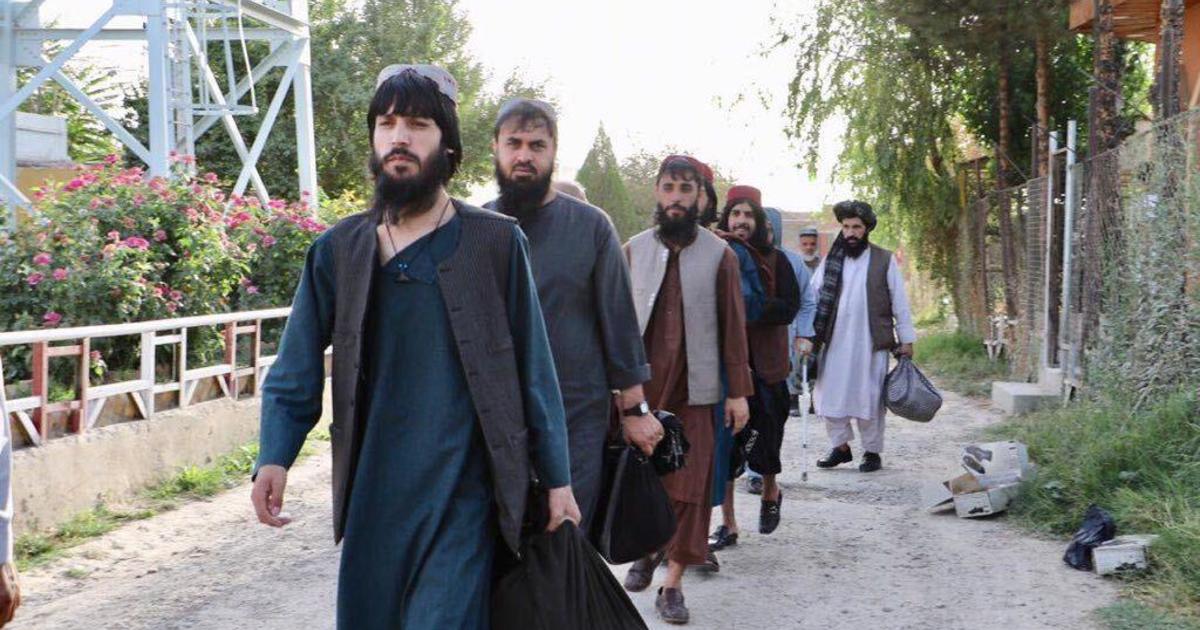Taliban prisoners walk free from the Pul-e-Charkhi jail in Kabul, Afghanistan, following their release on August 13, 2020.
Afghan National Security Council
The Afghan government released dozens more Taliban prisoners on Thursday, beginning the final phase of a detainee swap agreed in a deal between the U.S. and the insurgent group. Officials said 80 men were allowed to walk out of prison this week. The release of the remaining 320 or so represents what should be the last barrier to long-awaited direct talks between the Taliban and the Afghan government.
Afghan officials have now freed about 3,000 Taliban suspects from prison in exchange for the release of around 1,000 government forces from Taliban custody. The release of the last 400 militants, whom Afghan President Ashraf Ghani describes as “dangerous” individuals, has been hanging up the wider peace process aimed at eventually ending the violence that has plagued Afghanistan since the U.S.-led invasion in 2001.
Teen girl kills Taliban attackers with dad’s AK-47
Javid Faisal, spokesman for the Afghan National Security Council, confirmed that the government released 80 Taliban convicts on Thursday from among the final 400, “to speed up efforts for the direct talks and a lasting, nationwide ceasefire.”
Faisal did not say when the remaining inmates might be freed, and neither the Afghan government nor the Taliban has suggested a start date for the crucial face-to-face talks between the two sides.
Thus far the Taliban has refused to negotiate directly with the Afghan government, dismissing it as a puppet of the U.S. and insisting on talks only with American officials. The start of the direct “intra-Afghan talks” is considered a vital step in the peace process.
Violence in Afghanistan despite peace deal
07:11
Baz Muhammad, a Taliban suspect who had been jailed on a kidnapping conviction, was among the 80 people freed on Thursday. He said he hoped for peace in his country, and urged both sides to agree to a long-term ceasefire.
“I want them to stop this bloodshed,” he said in a video released by the Afghan government.
President Ghani has said the last batch of Taliban inmates slated for release do pose a security risk, but that their freedom is necessary to advance the cause of peace.
He said in remarks delivered virtually on Thursday for the Council on Foreign Relations that the inmates were “likely to pose a danger for us and the world, because it has drug dealers and hardened criminals.”
But the release of the hard-core insurgents was proscribed in the U.S.-Taliban agreement signed in Doha in February. Ghani’s administration was not involved in those talks. The deal lays out a framework for the withdrawal of all U.S. troops from Afghanistan by the middle of next year.
There are currently 8,600 U.S. troops in Afghanistan, but that number is set to drop to fewer than 5,000 before the U.S. election in November — all part of the ongoing process agreed to in Doha.
The intra-Afghan talks
When the last of the Taliban militants are set free, the intra-Afghan talks can begin.
The 21-member negotiating team representing the government in Kabul is expected to push the insurgent group for a permanent, nationwide ceasefire as soon as those meetings kick off. The insurgent group’s spokesman in Doha has said the Taliban is willing to discuss that proposition, in theory.
When asked by CBS News, however, spokesman Suhail Shaheen would not elaborate on what the group might demand in return for such a ceasefire.
Since the U.S.-Taliban deal was struck, the process of releasing the Taliban prisoners has been slow, and Taliban militants have increased their attacks throughout the country in the meantime.
An injured boy is carried in a hospital following a bombing attack on a funeral for a local police commander in Nangarhar, Afghanistan, May 12, 2020.
NOORULLAH SHIRZADA/AFP/Getty
On Friday, the government said at least 121 civilians had been killed over the past two weeks and 336 more wounded in Taliban attacks.
The intra-Afghan dialogue, once it begins, is expected to be a drawn-out and fragile process. Ghani has made it clear that while the U.S. government may be in a hurry to move the process forward, his administration — and the Afghan people — want peace, and they’re willing to wait for it if the Taliban fails to negotiate as a serious partner.
“Unlike their relation with the U.S., where they [Taliban] said they have time and you [U.S.] the clock, the rest of the Afghans have time. This time has to be either used productively… or it can turn into destruction,” he warned during the discussion with the Council on Foreign Relations.
